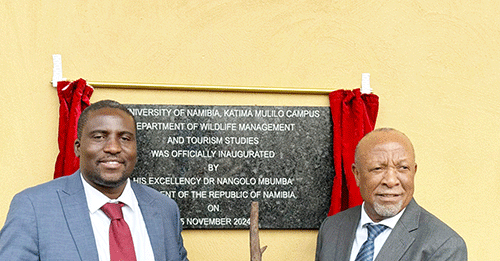KATIMA MULILO – President Nangolo Mbumba says one of the ways to address the immense challenges and development prospects in the Kavango-Zambezi Transfrontier Conservation Area (KAZA TFCA) is through youth development.
He made these remarks when he officially inaugurated the extension of the Wildlife Management and Tourism Studies’ department at Unam’s Katima Mulilo campus yesterday.
The new facility, valued at N$300 million, was funded by the German government through the KfW development bank.
“Our youth – if equipped with the requisite skills of research, technology, wildlife and tourism management practices, and many others – will be able to help us address the manifold challenges of wildlife management. They will also help us enhance and extract the maximum value that our communities can derive from our natural resources,” Mbumba said.
He highlighted that the Zambezi, Kavango East and West as well as Kunene regions face increased human-wildlife conflicts. Thus, Unam’s presence here will empower Namibia’s human resources with the required knowledge to craft strategies for peaceful human-wildlife co-existence.
He also noted that communities who are aware of the mutually-beneficial relationship between themselves and their environment can play the role of grassroots-based conservationists, than those outside the value chain of the natural resources.
He applauded the German government for the invaluable development support and cooperation since independence. “Given my recent interactions with the German Chancellor and President, I am convinced that Germany and Namibia will continue to share similar positive views on development and cooperation as was evident during the Summit of the Future at UNGA 79 in New York,” he indicated.
Mbumba said through the Office of the Vice Chancellor, Kenneth Matengu, and the Unam management and council, the government fully supports ongoing partnerships between Unam and German universities, staff and student exchanges, joint curriculum development and joint research. Unam has more than 50 partnerships with German universities.
Zambezi governor, Lawrence Sampofu acknowledged that the campus will conduct valuable research and devise mitigation strategies on human-wildlife conflict, which has become the order of the day.
German Ambassador to Namibia Thorsten Hutter said promoting sustainable tourism is crucial for local communities and healthy wildlife populations.
“With these conservation efforts, Namibia can be sure of a sustainable future for its people and its unique heritage. Tourism plays a crucial part in Namibia’s economy as it attracts tourists from all over the world,” he added.



